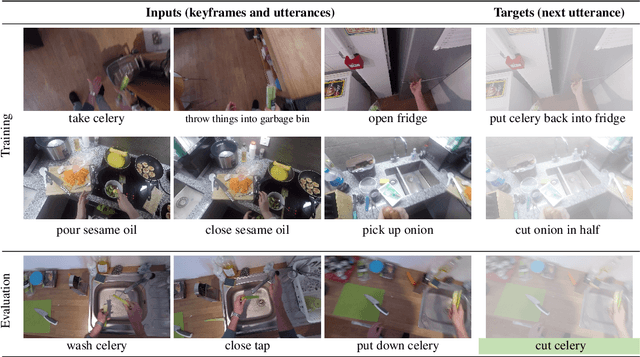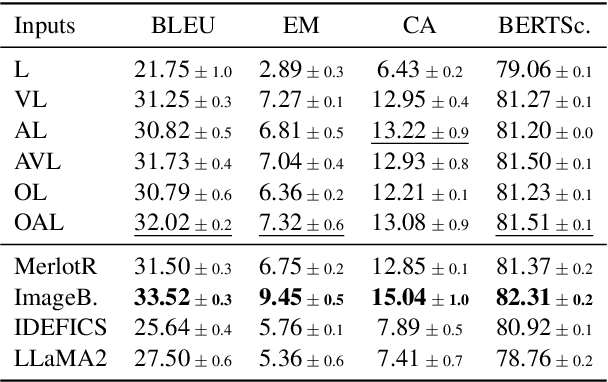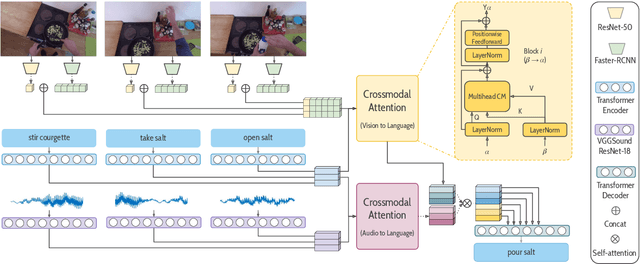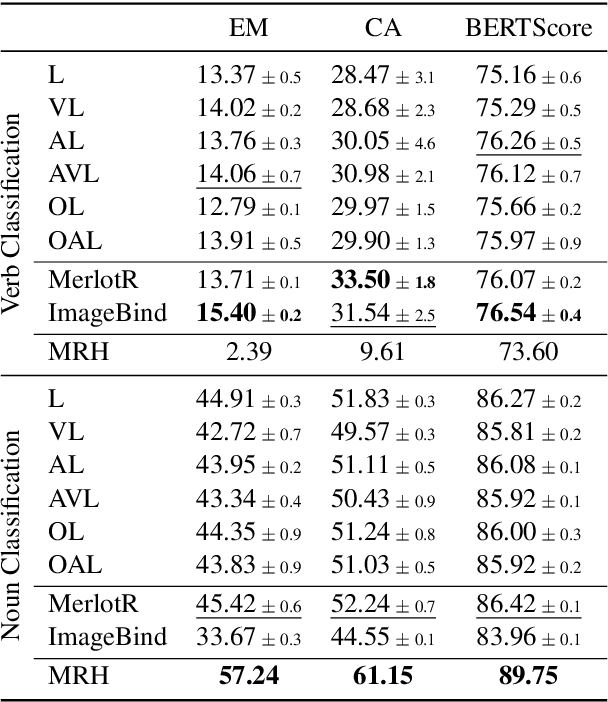Osman Batur İnce
Sample-efficient Integration of New Modalities into Large Language Models
Sep 04, 2025Abstract:Multimodal foundation models can process several modalities. However, since the space of possible modalities is large and evolving over time, training a model from scratch to encompass all modalities is unfeasible. Moreover, integrating a modality into a pre-existing foundation model currently requires a significant amount of paired data, which is often not available for low-resource modalities. In this paper, we introduce a method for sample-efficient modality integration (SEMI) into Large Language Models (LLMs). To this end, we devise a hypernetwork that can adapt a shared projector -- placed between modality-specific encoders and an LLM -- to any modality. The hypernetwork, trained on high-resource modalities (i.e., text, speech, audio, video), is conditioned on a few samples from any arbitrary modality at inference time to generate a suitable adapter. To increase the diversity of training modalities, we artificially multiply the number of encoders through isometric transformations. We find that SEMI achieves a significant boost in sample efficiency during few-shot integration of new modalities (i.e., satellite images, astronomical images, inertial measurements, and molecules) with encoders of arbitrary embedding dimensionality. For instance, to reach the same accuracy as 32-shot SEMI, training the projector from scratch needs 64$\times$ more data. As a result, SEMI holds promise to extend the modality coverage of foundation models.
Hippocrates: An Open-Source Framework for Advancing Large Language Models in Healthcare
Apr 25, 2024



Abstract:The integration of Large Language Models (LLMs) into healthcare promises to transform medical diagnostics, research, and patient care. Yet, the progression of medical LLMs faces obstacles such as complex training requirements, rigorous evaluation demands, and the dominance of proprietary models that restrict academic exploration. Transparent, comprehensive access to LLM resources is essential for advancing the field, fostering reproducibility, and encouraging innovation in healthcare AI. We present Hippocrates, an open-source LLM framework specifically developed for the medical domain. In stark contrast to previous efforts, it offers unrestricted access to its training datasets, codebase, checkpoints, and evaluation protocols. This open approach is designed to stimulate collaborative research, allowing the community to build upon, refine, and rigorously evaluate medical LLMs within a transparent ecosystem. Also, we introduce Hippo, a family of 7B models tailored for the medical domain, fine-tuned from Mistral and LLaMA2 through continual pre-training, instruction tuning, and reinforcement learning from human and AI feedback. Our models outperform existing open medical LLMs models by a large-margin, even surpassing models with 70B parameters. Through Hippocrates, we aspire to unlock the full potential of LLMs not just to advance medical knowledge and patient care but also to democratize the benefits of AI research in healthcare, making them available across the globe.
Sequential Compositional Generalization in Multimodal Models
Apr 18, 2024



Abstract:The rise of large-scale multimodal models has paved the pathway for groundbreaking advances in generative modeling and reasoning, unlocking transformative applications in a variety of complex tasks. However, a pressing question that remains is their genuine capability for stronger forms of generalization, which has been largely underexplored in the multimodal setting. Our study aims to address this by examining sequential compositional generalization using \textsc{CompAct} (\underline{Comp}ositional \underline{Act}ivities)\footnote{Project Page: \url{http://cyberiada.github.io/CompAct}}, a carefully constructed, perceptually grounded dataset set within a rich backdrop of egocentric kitchen activity videos. Each instance in our dataset is represented with a combination of raw video footage, naturally occurring sound, and crowd-sourced step-by-step descriptions. More importantly, our setup ensures that the individual concepts are consistently distributed across training and evaluation sets, while their compositions are novel in the evaluation set. We conduct a comprehensive assessment of several unimodal and multimodal models. Our findings reveal that bi-modal and tri-modal models exhibit a clear edge over their text-only counterparts. This highlights the importance of multimodality while charting a trajectory for future research in this domain.
Harnessing Dataset Cartography for Improved Compositional Generalization in Transformers
Oct 18, 2023



Abstract:Neural networks have revolutionized language modeling and excelled in various downstream tasks. However, the extent to which these models achieve compositional generalization comparable to human cognitive abilities remains a topic of debate. While existing approaches in the field have mainly focused on novel architectures and alternative learning paradigms, we introduce a pioneering method harnessing the power of dataset cartography (Swayamdipta et al., 2020). By strategically identifying a subset of compositional generalization data using this approach, we achieve a remarkable improvement in model accuracy, yielding enhancements of up to 10% on CFQ and COGS datasets. Notably, our technique incorporates dataset cartography as a curriculum learning criterion, eliminating the need for hyperparameter tuning while consistently achieving superior performance. Our findings highlight the untapped potential of dataset cartography in unleashing the full capabilities of compositional generalization within Transformer models. Our code is available at https://github.com/cyberiada/cartography-for-compositionality.
 Add to Chrome
Add to Chrome Add to Firefox
Add to Firefox Add to Edge
Add to Edge